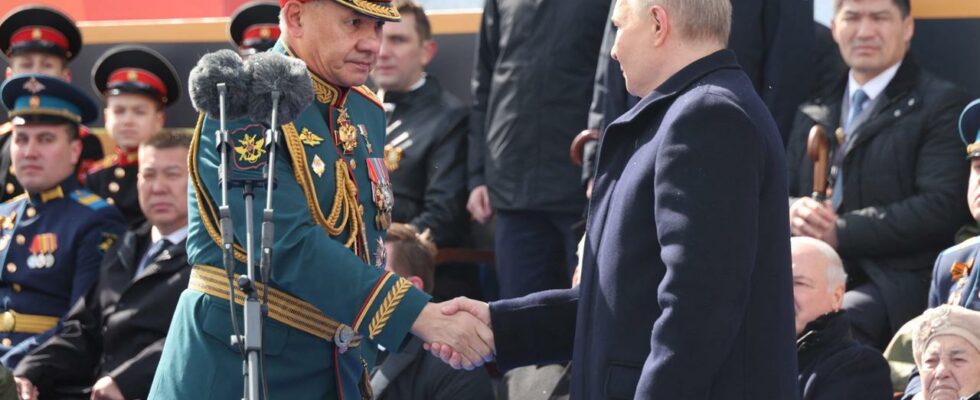interview
Russia’s Defense Minister Shoigu has been criticized for a long time – so why is he being replaced now? Russia expert Margarete Klein explains this with the Kremlin’s war aims and says what lessons the West should learn from them.
tagesschau.de: Why is Sergei Shoigu losing his post now that Russia is in the midst of some form of offensive?
Margarete Klein: Putin has chosen a face-saving path for Shoigu. He therefore chose the occasion to form a new government, which always occurs at the beginning of a president’s term in office. This maintains the appearance of normality – a recall at any other time would have been a clear sign of dissatisfaction with Shoigu. And at the same time Shoigu was offered the post of secretary of the National Security Council. This shows that Putin continues to value Shoigu as loyal and will not dismiss him into oblivion.
“Allegations of incompetence and corruption”
tagesschau.de: There has been criticism of Shoigu for a long time. How was he able to stay in office for so long?
Small: Shoigu is definitely a political heavyweight in Russia. He has been one of the most popular politicians in the country for more than 30 years. His popularity dates back to when he was Minister of Civil Defense under former President Boris Yeltsin. In this sense, Shoigu was not a creation of Putin, even if he was always loyal to him. For this, too, he is rewarded with the position of Secretary of the National Security Council.
On the other hand, Shoigu’s popularity suffered due to the war. This is not a decisive criterion for Putin. More crucial are military incompetence and conflicts between the defense industry as suppliers and the Ministry of Defense as customers, as well as corruption, which endangers the realization of the war goals. The open power struggle with former Wagner boss Yevgeny Prigozhin also damaged him, even if Shoigu won it.
To person
Margarete Klein is head of the Eastern Europe and Eurasia research group at the Foundation for Science and Politics (SWP) in Berlin. Her focus is on Russia’s foreign, security and military policy.
“Shoigu’s chair has already been sawn”
tagesschau.de: On the other hand, many leading representatives of the Putin system – and himself – are accused of enormous self-enrichment. Shoigu does not stand and did not stand alone.
Small: Corruption is the lubricant of the system and is not uncommon in the military. It is tolerated and encouraged as long as it does not have a negative impact on the overall goal. The opportunities for enrichment have increased due to increased military spending, and at the same time the war exposed the consequential costs of corruption in the military. Russia spends around 29 percent of its budget on defense, a huge sum. And it wants to win for that and is now looking more closely at corruption in this area than in other sectors.
Recently, one of Shoigu’s deputies was arrested in uniform in front of the camera – this showed that Shoigu’s chair had already been sawn. Above all, the leadership apparently no longer believed that he was the one who could move the war against Ukraine into a new phase.
“Technocrat without home power”
tagesschau.de: This is more likely to be expected of a civilian. Andrei Beloussov comes from the business world. What signal does this send?
Small: Russia’s leadership obviously believes that this war will not be decided in a short time by numerical superiority alone, but is preparing for a long war that will be won by whoever produces modern armaments most efficiently and effectively. That’s why, with Beloussov, they’re bringing in someone from the business sector who has no military background at all, who is loyal and a so-called technocrat with no power of his own. This means that a person is elected who does not have to serve any networks in the Ministry of Defense and is easier to control by the Kremlin. At the same time, this is probably linked to the hope that the gigantic resources in the defense budget will be used as efficiently as the Kremlin wants, and Shoigu did not stand for that.
tagesschau.de: What is Beloussov likely to do differently?
Small: Beloussow will look at this with an economist’s eye and try to promote efficiency improvements and modernization. This means that business and the military will be much more closely linked in the arms industry, because up to now the needs of the military have not necessarily matched what the arms industry can deliver. It is also about innovative technologies and AI.
“Russia is preparing for a long war”
tagesschau.de: Does this mean that Russia is switching entirely to a war economy?
Small: This is not yet the case because a war economy would mean that the priority in all areas would be solely on war. Although the war has priority, it is certainly not the sole criterion, also in order to avoid too many domestic political impositions. But Russia’s war aims still exist. The leadership is preparing for a long war, as the latest budget for the military shows.
tagesschau.de: What does this mean for the West? What lessons should Ukraine’s supporters learn from this reshuffle?
Small: With regard to Ukraine, Russia is betting that Ukraine will not receive as many and as modern military equipment from the West as it needs and that Russia will be able to produce more in the future. The West must adapt to this. And he must look at the quantity with which high-quality new weapon systems are produced by the Russian defense industry and made available to the army, for example in the field of artificial intelligence, with automated or semi-automated combat systems. This could also increase the threat posed by Russia to us beyond Ukraine.
The interview was conducted by Eckart Aretz, tagesschau.de

